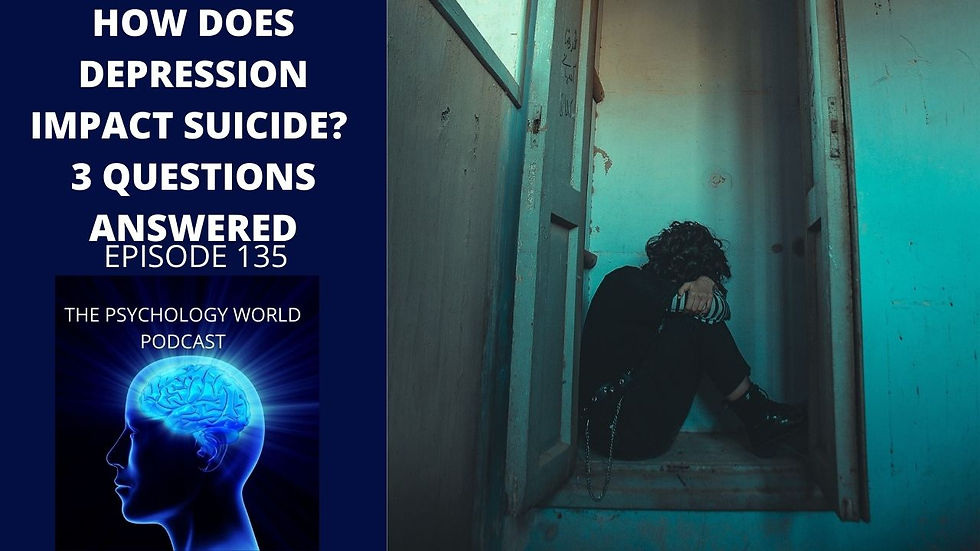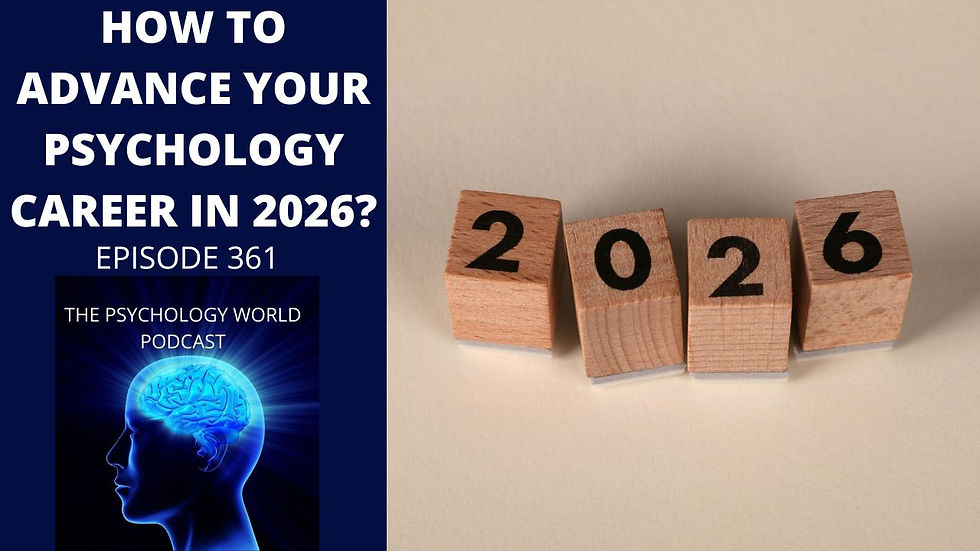How Does Depression Impact Suicide? A Clinical Psychology Podcast Episode.
- Connor Whiteley

- Feb 28, 2022
- 5 min read

After looking at suicide already in a lot of depth, we need to consider how depression affects suicide. Since as always there are a lot of myths and misconceptions about how depression impacts suicide, so in this psychology podcast episode, that is exactly what we seek to look at. How does Depression impact suicide?
This clinical psychology episode has been sponsored by Abnormal Psychology: The Causes and Treatments For Depression, Anxiety and More Third Edition. Available from all major eBook retailers and you can order the paperback and hardback copies from Amazon, your local bookstore and local library, if you request it.
Other Useful Episodes:
How Does Depression Impact Suicide?
How Does Depression Lead To Suicidal Thinking?
Lots of different people experience suicidal thinking in their life and this usually happens after a difficult life event. Like the loss of a loved one, job or something else that is important to them, as we’ve spoken about on previous episodes.
In addition, depression links to this type of thinking because it impairs our cognitive flexibility as it changes our patterns of feeling and thinking so we cannot see a way out of our current situation. As well as we cannot imagine or even entertain the idea of a better future.
Also the Cognitive Triad in depression leads a person to focus on all their setbacks, all their so-called mistakes and what makes them a failure. Including relationship failures and adverse childhood experiences. Therefore, this only adds to their feelings of worthless and depression only magnifies the pain they’re suffering.
All leading to a depressed person being more likely to seek out suicide as the only viable escape route from all this suffering and psychological pain.
Personally, this is rather tragic to write about but it is important. It is important for all of us to understand the importance of treatment and the work we do as psychology professionals and in the future psychology students. It is the work we do that can save lives, or at the very least help people decrease and cope with their psychological distress.
This is why psychology is critical.
How Common Is Suicide In Depression?
According to the U.S Department of Health and Human Services, it turns out 2% of people who are treated for depression in an outpatient service take their own life. As well as out of all those people who were ever hospitalised for depression, the death rate by suicide is 4%.
Before I go on to dive into the numbers a bit more, I just wanted to mention that this does sort of fly in the face of a massive misconception about suicide. Since I have heard plenty of times through the grapevine so to speak that people believe that all depressed people commit suicide.
Thankfully that is far, far, far from the case. But still 4% is too high for my liking. It should be 0% in an ideal world and thankfully that is where psychologists come in.
Additionally, around 60% of suicide victims have a mood condition that is potentially treatable and younger people who kill themselves often have a substance abuse difficulty as well. Of course, in addition, to the other life factors that can impact suicide.
And this is the main reason why I talk about all these things in my books, in-person and on the
podcast. Because even if I can educate or prompt one person to convince others to get professional help if they have a mental health condition, then that means I could have potentially saved a life.
This is why psychologists and therapists are critical because without us so many people would still be suffering.
As well as this is why I hate with a passion all the rubbish that psychology gets. With people thinking we know nothing, psychology is profiling and therapists are dangerous (as in villains in TV and books). Because this bad representation isn’t helpful to us, our clients and the people who need professional aid but don’t trust us.
Anyway jumping off my soapbox now!
Do Anti-Suicide Pacts Work?
Wow!
This is actually rather cool and rather clever.
So these pacts have been around for ages between at-risk patients and therapists as a way to stop the patient from committing suicide. These pacts or contracts can be written or verbal but that isn’t important. What is important is that it gets the at-risk patient to not self-harm or commit suicide.
As well as the pacts make the patient call the therapist, an emergency number or 999 if they even think about suicide for a moment.
Furthermore, effective suicide contracts which are written, dated and signed with a copy given to each person and kept in an accessible location. Not only ensure the patient doesn’t kill themselves but it ensures they call emergency numbers when they’re in danger.
Again what is so brilliant about these pacts is they are not legally binding so that increases comfort for the patient. As the therapist cannot and does not need to file it in court and get the patient arrested. Because of course, suicide is a crime.
Also this is already very commonplace in certain industries where the suicidal rates are extremely high. Like in paramedics and other first responders, with them becoming more and more common amongst friends and family members of anyone who has been suicidal.
And this is what I love about this podcast, because I think this pact is utterly amazing. It is such an effective and easy to do method that I’m extremely pleased that people have this option.
Conclusion:
After today’s episode, I’m actually… rather hopeful about the future because if this episode has taught me anything. It is how important psychology students (for the future) and psychology professionals are, because we are a massive line of defence for depressed people.
Also I guess that was the real point for today’s episode, it was to teach all of us how valuable we are for depressed people, and why our work matters so much to so many.
And I have to admit I love those anti-suicide pacts. I think they’re a great idea. Of course, nothing the podcast is ever official advice, but they’re still pretty great.
I really hope you enjoyed today’s episode.
If you want to learn more, please check out:
Abnormal Psychology: The Causes and Treatments For Depression, Anxiety and More Third Edition. Available from all major eBook retailers and you can order the paperback and hardback copies from Amazon, your local bookstore and local library, if you request it.
Have a great day!
Clinical Psychology Reference:
I truly hope that you’re enjoyed this blog post and if you feel like supporting the blog on an ongoing basis and get lots of rewards, then please head to my Patreon page.
However, if want to show one-time support and appreciation, the place to do that is PayPal. If you do that, please include your email address in the notes section, so I can say thank you.
Which I am going to say right now. Thank you!
Click https://www.buymeacoffee.com/connorwhiteley for a one-bit of support.
Click www.paypal.me/connorwhiteley1 to go to PayPal.







Comments